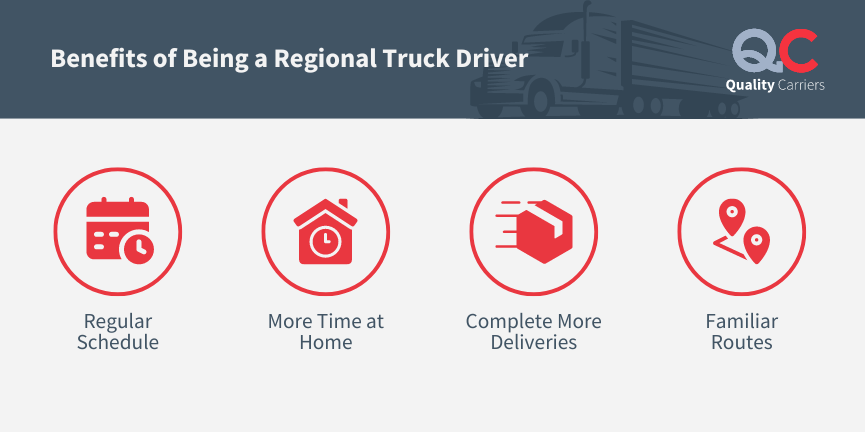Regional truck driving balances the long-haul lifestyle of over-the-road (OTR) driving and the home time of local driving. But what exactly does it entail, and how can one pursue a career in this field?
In this blog post, we’ll explore regional truck driving, what it means to be a regional truck driver and the steps to becoming one. Whether considering a career change or simply curious about the profession, read on to discover the ins and outs of regional truck driving.
What Is a Regional Truck Driver?
A regional truck driver is a professional driver who operates commercial vehicles to transport goods within a specific geographic region. Unlike long-haul truck drivers who cover extensive distances across multiple states or regions, regional truck drivers typically focus on shorter routes within a designated area. They may return home daily or weekly, offering a better work-life balance than long-haul drivers. Regional truck drivers play a crucial role in facilitating the movement of goods between cities, states, or neighboring regions, contributing to the efficiency of supply chains and logistics networks.

How to Become a Regional Truck Driver
To operate a regional truck within city, county, or state boundaries, drivers need a:
- Commercial Driver’s License (CDL). Trucking companies typically specify the type of CDL required in their employment applications.
- Employers may also demand a clean driving record, which can be ensured by organizations such as the Department of Transportation (DOT) for traffic and Federal Motor Carrier Safety Administration (FMCSA) and cargo safety rules.
- Using checklists and effectively communicating repair needs helps drivers ensure they understand their vehicle’s maintenance requirements.
- While a degree is optional to begin working as a regional, local, or OTR (Over-the-Road) driver, age restrictions may exist. Drivers must be at least 18 to obtain a CDL for intrastate driving, while the minimum age requirement is 21 for interstate driving.

Benefits of Being a Regional Truck Driver
Regular Schedule
Regional truck driving often involves more predictable schedules compared to long-haul routes. Drivers may have set start and end times for their shifts and consistent routes and delivery schedules. This regularity allows drivers to plan their personal lives more effectively, knowing when they will be working and have time off. A regular schedule also promotes better sleep patterns and reduces the stress associated with irregular work hours, contributing to overall job satisfaction and mental well-being.
More Time at Home
Regional truck drivers typically operate within a specific geographic area, allowing them to return home more frequently than long-haul drivers who may spend weeks away. This allows regional drivers to spend quality time with their families, maintain social connections, and enjoy a better work-life balance. The ability to be home regularly enhances overall well-being and reduces the strain of extended periods away from loved ones.
Complete More Deliveries
Regional truck drivers can complete more deliveries within a shorter period due to their localized routes. Unlike long-haul drivers who cover vast distances with fewer stops, regional drivers make multiple deliveries and pickups daily or weekly. This frequent interaction with customers and distribution centers allows them to maximize their productivity and efficiency, contributing to higher earning potential. Additionally, completing more deliveries enhances job satisfaction as drivers regularly experience a sense of accomplishment from meeting or exceeding delivery targets.
Familiar Routes
Regional truck drivers operate within specific geographic regions, familiarizing them with local roads, traffic patterns, and delivery destinations. This familiarity with their routes offers several advantages, including increased efficiency, reduced travel time, and enhanced safety. Knowing the best routes, shortcuts, and potential traffic bottlenecks enables drivers to plan their journeys more effectively, optimize fuel usage, and minimize the risk of delays or accidents. Familiarity with delivery locations also streamlines the loading and unloading, ensuring smoother logistics operations and better customer service. Driving familiar routes enhances job satisfaction and confidence while reducing stress associated with navigating unfamiliar territory.
Regional Truck Driver Industries
Regional truck drivers play a crucial role in various industries, facilitating the efficient transportation of goods and materials within specific geographic areas. Here are some industries where regional truck drivers are in demand:
- Natural gas
- Communications
- Sporting events
- Medical
- Mail service
- Express delivery
- Food services
- Electric power
- Moving
- Construction
Start Your Regional Truck Driving Career at Quality Carriers
If you want to pursue a career as a regional truck driver, Quality Carriers offers comprehensive training programs and job placement assistance. Focusing on safety, professionalism, and driver satisfaction, we equip aspiring drivers with the skills and resources to excel in this rewarding profession.
Whether you’re embarking on a new career path or looking to advance your existing skills, Quality Carriers is committed to helping you achieve your goals in the trucking industry. Contact us today to start on your path to becoming a successful regional truck driver!
Regional Truck Driver FAQs
How does a regional truck driver differ from other truck driver jobs?
Regional truck drivers usually have set routes within a designated area, allowing for more predictable schedules and increased time at home compared to long-haul trucking.
What are the typical duties of a regional truck driver?
Duties include transporting goods between warehouses, distribution centers, and retail locations, adhering to delivery schedules, and maintaining accurate records.
How can I advance my career as a regional truck driver?
Advancement opportunities include:
- Gaining experience to qualify for higher-paying positions.
- Obtaining endorsements for specialized driving tasks.
- Pursuing additional training and certifications.









